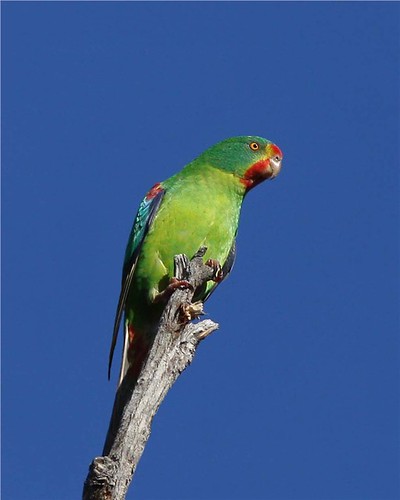 BIRDWATCHERS: NPWS Ranger, Robyn Kesby, Chris Tzarvos from Birds Australia and local photographer and birdwatcher, Max Sutcliffe take a closer look at a large group of endangered Swift Parrots at Nelsons Beach in Mimosa Rocks National Park south of Narooma.
BIRDWATCHERS: NPWS Ranger, Robyn Kesby, Chris Tzarvos from Birds Australia and local photographer and birdwatcher, Max Sutcliffe take a closer look at a large group of endangered Swift Parrots at Nelsons Beach in Mimosa Rocks National Park south of Narooma.
The small green Swift Parrot is among the most endangered parrots in the country with less than a thousand breeding pairs remaining.
The species annually migrates between Tasmania and southeastern Australia but has dramatically declined in numbers because of habitat disturbance and an unfortunate habit of colliding into windows.
NPWS Ranger, Robyn Kesby, said today that anyone who knows anything about this rare species is very excited about the news they have arrived in such numbers on the Far South Coast.
"Seeing one would be a real treat but local bird group, the Far South Coast Birdwatchers and experts from Birds Australia, have reported seeing as many as 350 in one group at Corunna State Forest south of Narooma and another group of 200 at Nelsons Beach in Mimosa Rocks National Park," Ms Kesby said.
 RARE SIGHTING: Local birdwatchers have been thrilled to see the arrival of about a third of the total national population of the highly endangered Swift Parrot on the Far South Coast (Photos by Max Sutcliffe).
RARE SIGHTING: Local birdwatchers have been thrilled to see the arrival of about a third of the total national population of the highly endangered Swift Parrot on the Far South Coast (Photos by Max Sutcliffe).
Chris Tzaros from Birds Australia said that there was some concern earlier when Swift Parrots were not appearing at their more regular locations this season.
"I think that it is likely the serious drought conditions which have impacted on their favoured locations such as the box-ironbark woodlands of central Victoria and the inland slopes of the divide in NSW combined with favourable flowering in coastal spotted gum forests is why we are seeing them in such numbers on the Far South Coast.
Local birdwatcher and photographer, Max Sutcliffe said today that he was thrilled to be able to see and photograph this rare visitor.
"When I heard that Chris Tzaros from Birds Australia had found over 350 in Corunna State Forest feeding on spotted gum I immediately thought of Nelsons Beach in Mimosa Rocks National Park.
"I went out there on June 20 and much to my delight saw more than 20 feeding on blossom and lerp.
"On following visits their numbers increased to more than 100 within two weeks, some seen feeding on Banksia flowers also. This was an awesome experience as I watched two flocks of over 50 fly in and they filled the sky," Mr Sutcliffe said.
Because it is so rare the Swift Parrot is the focus of intensive efforts nationally to reverse its decline. A National Recovery Program is active for the Swift Parrot with the help of volunteers in NSW, ACT, Qld, Vic and SA who help conduct national surveys twice annually that track the movement of this species across the landscape.